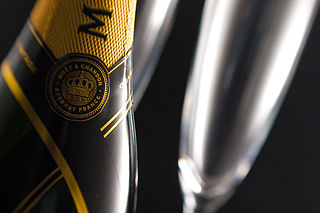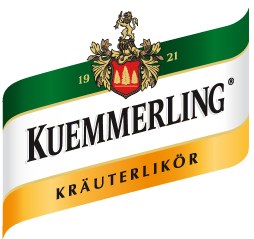
Sparkling wine is a wine with significant levels of carbon dioxide in it, making it fizzy. While it is common to refer to this as champagne, European Union countries legally reserve that word for products exclusively produced in the Champagne region of France. Sparkling wine is usually either white or rosé, but there are examples of red sparkling wines such as the Italian Brachetto, Bonarda and Lambrusco, and the Australian sparkling Shiraz. The sweetness of sparkling wine can range from very dry brut styles to sweeter doux varieties.

Biebrich is a borough of the city of Wiesbaden, Hesse, Germany. With over 38,000 inhabitants, it is the most-populated of Wiesbaden's boroughs. It is located south of the city center on the Rhine River, opposite the Mainz borough of Mombach. Biebrich was an independent city until it was incorporated into Wiesbaden in 1926.

Moët & Chandon, also known simply as Moët, is a French fine winery and part of the luxury goods company LVMH Moët Hennessy Louis Vuitton SE. Moët et Chandon is one of the world's largest champagne producers and a prominent champagne house. Moët et Chandon was established in 1743 by Claude Moët, and today owns 1,190 hectares of vineyards, and annually produces approximately 28,000,000 bottles of champagne.

Robert Alwin Schlumberger, Edler von Goldeck was an entrepreneur and the first producer of sparkling wine in Austria.

The German wine classification system puts a strong emphasis on standardization and factual completeness, and was first implemented by the German Wine Law of 1971. Nearly all of Germany's vineyards are delineated and registered as one of approximately 2,600 Einzellagen, and the produce from any vineyard can be used to make German wine at any quality level, as long as the must weight of the grapes reaches the designated minimum level. As the current German system does not classify vineyards by quality, the measure of wine ’quality’ is the ripeness of the grapes alone.
GALLO is a winery and distributor headquartered in Modesto, California. It was founded in 1933 by Ernest Gallo and Julio Gallo of the Gallo family, and is the largest exporter of California wines. It is the largest wine producer in the world, producing over 3% of the world's entire annual supply of 35 billion bottles with an annual revenue of $5.3 billion it is also the largest family-owned winery in the United States. Gallo provides about 3,500 jobs to Modesto residents and 2,500 jobs in other parts of the state, country, and world.
The glossary of wine terms lists the definitions of many general terms used within the wine industry. For terms specific to viticulture, winemaking, grape varieties, and wine tasting, see the topic specific list in the "See also" section below.

Sparkling wine production is the method of winemaking used to produce sparkling wine. The oldest known production of sparkling wine took place in 1531 with the ancestral method.

Dr. Oetker is a German multinational company that produces baking powder, cake mixes, frozen pizza, pudding, cake decoration, cornflakes, birthday candles, beer, and various other products.

József Törley is credited as having established one of the most successful brands of sparkling wine outside of the Champagne region in the late 19th and early 20th centuries.

Törley is the leading sparkling wine producer in Hungary. It was founded by József Törley in 1882 in Budafok and over the course of the following years became one of the leading sparkling wine producers in Europe.

Freixenet is a Spanish producer of cava and other sparkling and still wines, founded in 1914 in Sant Sadurní d'Anoia, in the province of Barcelona. It is the largest producer of traditional method sparkling wine worldwide, and the largest exporter of Cava. It is chaired, as of November 2021, by Alfred Oetker, and completing the Board of Directors are Pedro Ferrer, José María Ferrer, Carl Ferdinand Oetker and Andreas Brokemper.

Deutz, formerly known as Deutz & Geldermann, is a Champagne producer based in the Aÿ region of Champagne. The house was founded in 1838 by William Deutz and Pierre-Hubert Geldermann and has since been run by successive generations of the Deutz and Geldermann families.

Kuemmerling is the brandname of a type of Kräuterlikör from Germany, belonging to the group of Halbbitter.
Angelli Spumante & Aperitive is one of the most important sellers of alcoholic beverages in Romania, holder of the Angelli brand, leader on the sparkling wine market with a 70% share. The company is based in Bucharest. It was established in 1994 as Astese Production SRL but changed its name to Angelli Spumante & Aperitive in 2009. The company owns a production facility(closed in 2014) located in Bucharest, that was built in 1999 with a capacity of 80,000 bottles per day.

Princess Tatiana von Metternich-Winneburg was a Russian aristocrat, philanthropist, artist, and patron of the arts. She published her books and watercolours under the name Tatiana von Metternich. She supported charity, especially the Red Cross and the Order of St. Lazarus, which she served as Grand Bailiff for Germany. She was a founding member of the Rheingau Musik Festival, made parts of Schloss Johannisberg available as concert venues for the festival and served as the president of its Kuratorium until her death.
Wodka Gorbatschow is a German vodka brand. It has been produced in Berlin since 1921. Since 1960, it is owned by the Söhnlein Rheingold AG, a part of the Henkell & Co. Sektkellerei KG, which is owned by Dr. Oetker since 1996.

Pott also known as Der Gute Pott is a spirits brand for brown overseas rum of the company H. H. Pott Nachfgr. Vertriebsgesellschaft mbH Rumhandelshaus, in Flensburg. It has been a subsidiary of Henkell & Co. Sektkellerei, a member of the Oetker Group, since 2006.

The Oetker family is a German entrepreneurial dynasty from Bielefeld, Germany, who made their fortune in baking powder. The modern Oetker family was established by patriarch August Oetker who was the founder of Dr. Oetker, a leading German food manufacturing concern, which employs 29,000+ employees worldwide (2023).

Alfred Gratien is a champagne house, based in Épernay. It is named after its founder, who established the firm in 1864. The business was family-controlled until the start of the 21st century, and retains a strongly traditional approach to wine making.

















